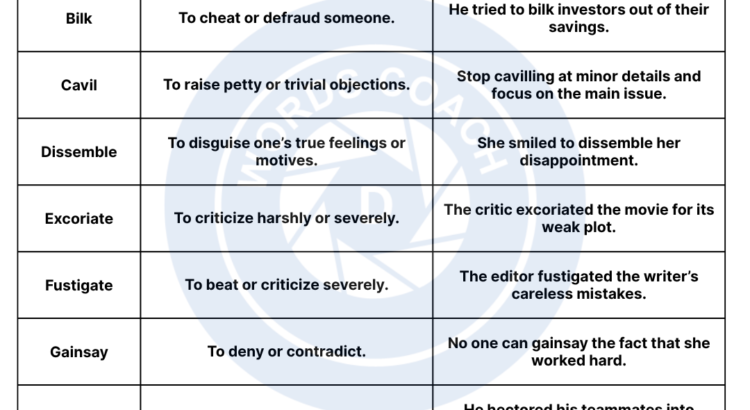Rare or Obscure Verbs
Language is a living, breathing thing full of surprises, twists, and hidden gems. While we all use common verbs like go, see, or think, the English language hides hundreds of rare or obscure verbs that can make your writing more colorful, expressive, and memorable.
What Are Rare or Obscure Verbs?
Rare or obscure verbs are action words that aren’t commonly used in everyday English but carry very specific, sometimes poetic meanings. They often come from older forms of English, literature, or even other languages.
Rare or Obscure Verbs with meaning and Examples
Abrogate – To repeal or abolish a law or custom.
Example: The government decided to abrogate the outdated regulations.
Bilk – To cheat or defraud someone.
Example: He tried to bilk investors out of their savings.
Cavil – To raise petty or trivial objections.
Example: Stop cavilling at minor details and focus on the main issue.
Dissemble – To disguise one’s true feelings or motives.
Example: She smiled to dissemble her disappointment.
Excoriate – To criticize harshly or severely.
Example: The critic excoriated the movie for its weak plot.
Fustigate – To beat or criticize severely.
Example: The editor fustigated the writer’s careless mistakes.
Gainsay – To deny or contradict.
Example: No one can gainsay the fact that she worked hard.
Hector – To bully or intimidate through bluster.
Example: He hectored his teammates into following his plan.
Inculcate – To instill an idea or habit through persistent instruction.
Example: Teachers inculcate moral values in their students.
Juxtapose – To place side by side for contrast or comparison.
Example: The artist juxtaposed light and shadow brilliantly.
Kvetch – To complain persistently.
Example: She’s always kvetching about her long commute.
Lambaste – To criticize or scold harshly.
Example: The coach lambasted the team for poor performance.
Malinger – To pretend to be ill to avoid work or duty.
Example: He malingered to skip the training session.
Natter – To talk casually or at length about trivial matters.
Example: They nattered for hours over coffee.
Obfuscate – To make something unclear or confusing.
Example: The report’s jargon only obfuscated the real issue.
Peregrinate – To travel or wander from place to place.
Example: They peregrinated across Europe for a year.
Quaff – To drink deeply or heartily.
Example: He quaffed a mug of ale after the long day.
Ratiocinate – To reason methodically and logically.
Example: The detective ratiocinated through every clue.
Scintillate – To sparkle or emit flashes of light; to be brilliantly witty.
Example: Her conversation scintillated with clever remarks.
Traduce – To speak maliciously and falsely about someone.
Example: They traduced his reputation out of jealousy.
Ululate – To howl or wail as an expression of emotion.
Example: The mourners ululated during the funeral.
Vacillate – To waver between opinions or actions.
Example: He vacillated between staying and leaving.
Welter – To move in a turbulent or confused manner.
Example: The crowd weltered in chaos after the announcement.
Expiate – To make amends for guilt or sin.
Example: He tried to expiate his mistake with a sincere apology.
Yammer – To talk loudly or complain persistently.
Example: The kids yammered about wanting more snacks.
Zephyrize – To make light, airy, or delicate.
Example: The breeze zephyrized the curtains gently.
Adumbrate – To foreshadow or give a vague outline of something.
Example: The early scenes adumbrate the film’s tragic ending.
Betoken – To be a sign or indication of something.
Example: His silence betokened deep resentment.
Cauterize – To burn or sear tissue (literally or figuratively).
Example: The speech was meant to cauterize public anger.
Descry – To catch sight of something distant or obscure.
Example: From the hill, they descried the village below.
Learning rare or obscure verbs is like unlocking secret doors in the English language. They give you access to shades of meaning that ordinary verbs can’t express. So next time you write, don’t obfuscate your brilliance let these rare gems shine through!

